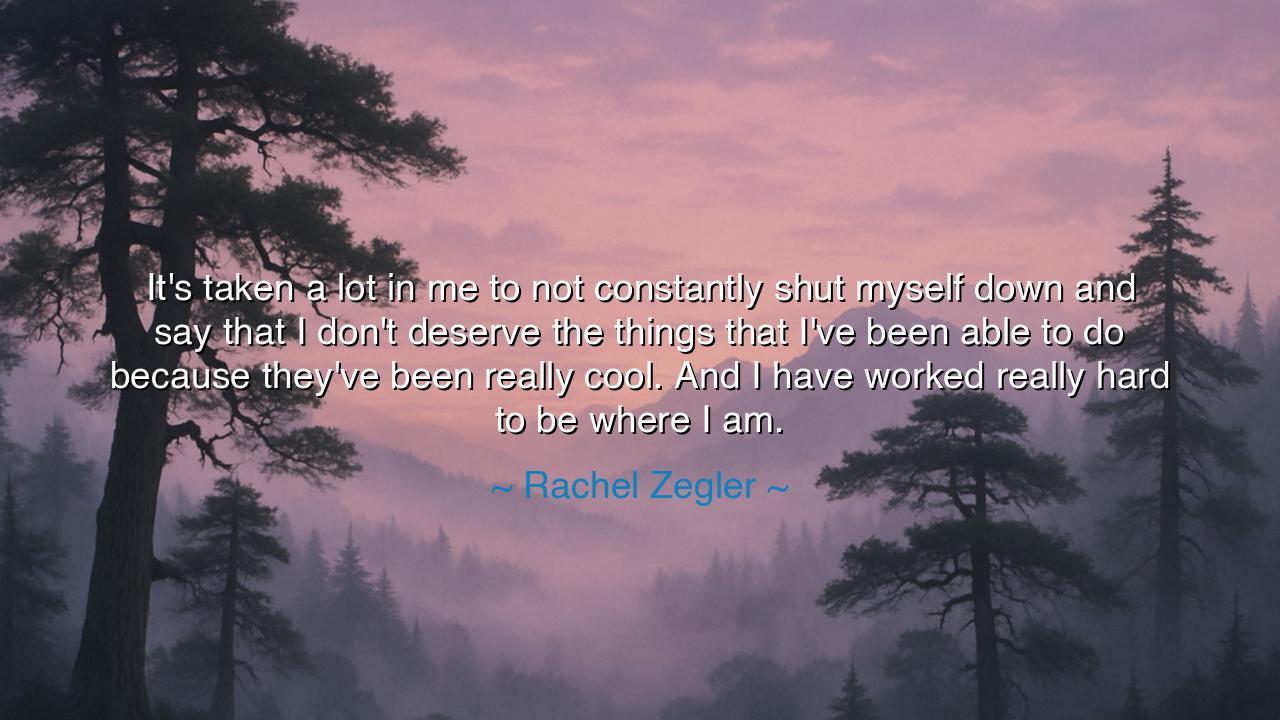
It's taken a lot in me to not constantly shut myself down and say
It's taken a lot in me to not constantly shut myself down and say that I don't deserve the things that I've been able to do because they've been really cool. And I have worked really hard to be where I am.






The words of Rachel Zegler—“It’s taken a lot in me to not constantly shut myself down and say that I don’t deserve the things that I’ve been able to do because they’ve been really cool. And I have worked really hard to be where I am.”—are a confession of courage spoken in the quiet battlefields of the soul. They are the words of one who has faced not an outer enemy, but an inner one—the subtle, relentless voice of self-doubt. In these few lines, Zegler opens a window into a truth as old as humanity: that the hardest victory is not over the world, but over one’s own disbelief. Hers is the song of the modern heart, echoing an ancient struggle—the struggle to accept one’s own worth.
Born into the glare of fame at a young age, Rachel Zegler rose swiftly from obscurity to stardom through her role in West Side Story. But behind the applause and the lights, she reveals the shadow that follows every triumph—the fear of not deserving what one has achieved. This fear, though quiet, is fierce; it gnaws at the spirit of even the most talented, whispering that success is a mistake, that praise is misplaced. Yet Zegler’s words are not ones of surrender. They are words of awakening—a recognition that her achievements are not accidents of fate, but the fruits of labor, the results of years of toil, persistence, and faith. To say “I have worked really hard to be where I am” is to reclaim ownership of her journey, to silence the false humility that denies the soul its dignity.
The ancients, too, knew this battle well. Marcus Aurelius, emperor and philosopher, once wrote that “the soul becomes dyed with the color of its thoughts.” A man who constantly tells himself he is unworthy will soon live as though he is. Zegler’s struggle mirrors this timeless truth: when the mind is steeped in self-doubt, even victory feels like fraudulence. But to rise above such thoughts—to speak the truth that one’s efforts were real, one’s path earned—is a sacred act of restoration. It is not pride, but balance. For humility is not denying one’s light; it is seeing it clearly, and knowing it shines alongside the light of others.
History offers us countless souls who have faced this same quiet war. Consider Joan of Arc, the humble peasant girl who led armies and defied kings. Even as she heard the voice of destiny, she trembled at the thought that she might be unworthy of it. “I am but a poor maid,” she said. Yet she did not let her doubt silence her purpose. She stepped forward, trembling but resolute, and through that courage she changed the course of nations. So too does Rachel Zegler, in her own age, speak to those who doubt their own deservingness—to those who stand on the threshold of their dreams but dare not walk through the door.
The wisdom in her words lies not merely in the confession of struggle, but in the refusal to surrender to it. She acknowledges the labor of the heart—the effort it takes to speak kindly to oneself, to resist the self-inflicted wounds of comparison and unworthiness. In her reflection, there is an ancient lesson reborn: that every gift, every achievement, must be received with gratitude and courage, not with guilt. For to reject one’s success is to reject the countless hours, tears, and hopes that forged it. The universe gives no blessing to the idle; it gives to those who strive. To accept that gift is not arrogance—it is reverence.
This teaching extends to all who listen. Too often, we diminish our own triumphs, fearing that confidence will be mistaken for vanity. We hide our talents, apologize for our success, and whisper our joy when we should proclaim it. But the wise know that self-acceptance is not pride—it is truth. To deny your own worth is to deny the very effort that brought you here. Each step of your journey, each hardship overcome, is sacred; to see it clearly is to honor not only yourself but the divine spark that works through you.
Thus, the lesson of Rachel Zegler’s words is this: Honor your work, and do not apologize for your light. Let humility and confidence walk hand in hand. When the voice of doubt whispers that you are not enough, answer it with evidence—your effort, your perseverance, your scars, your triumphs. Remember that greatness is never given; it is built. You deserve the fruits of the labor you have tended with your hands and heart.
So, children of the present and heirs of the eternal struggle, learn from her wisdom. Do not shut yourself down. Do not shrink before your blessings. The world needs your gifts fully lived, not half-hidden behind false modesty. Stand as Rachel Zegler stands—aware of your imperfection, yet unashamed of your achievement. For only when you can say with courage, “I have worked hard to be here”, will you truly begin to live in the full glory of who you are meant to be.






AAdministratorAdministrator
Welcome, honored guests. Please leave a comment, we will respond soon